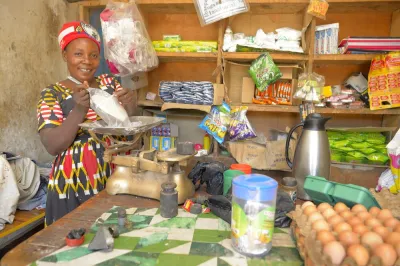Can You Get to Know Your Customer Through an App?

Ibrahim Eid is the co-founder and COO of Valify. He graduated with a finance degree in 2016 from the American University in Cairo. Over the last three years, Eid has been working with startups. Before co-founding Valify, he ran an e-commerce website funded by the Ministry of Investment. His professional experience also includes working with an investment bank and a business law consulting firm.
Valify is an e-KYC (electronic Know-Your-Customer) software solution which enables service providers to digitally identify their customers, verify official documents remotely and extract valid data without compromising integrity or security. The company from Egypt won first prize at this year’s Arab Financial Inclusion Innovation Prize (AFIIP), receiving a grant of $30,000. Miranda Beshara, Arabic Editor for FinDev Gateway, interviewed Ibrahim Eid, co-founder and COO of Valify, about electronic digital identity, innovation and financial inclusion in Egypt and beyond.
FinDev: Congratulations on winning first place in this year’s AFIIP. Can you tell us how your solution will contribute to financial inclusion in the Arab World?
Ibrahim: Thank you, it has been a very welcome surprise. Our solution greatly impacts financial inclusion in the Arab World by being the first in the region to enable customers to access financial services without having to visit branches, as well as allowing service providers to expand their reach exponentially at very little added cost. Customers will get an improved service that is convenient, digital from end-to-end, and still maintains global security standards. This means accelerating financial inclusion by removing friction that prevents customers from receiving such financial services. It also means that safety and security can be added to non-regulated industries.
Valify has been selected to join the first Regtech Sandbox program recently created by the Central Bank of Egypt (CBE). This program offers a controlled environment through which companies can pilot new technologies that do not have the needed laws to accommodate them yet. Once we graduate from the CBE Sandbox, Valify will be given the necessary licensing and regulations to be able to operate fully in the market.
FinDev: What do you believe are the minimum Know Your Customer (KYC) requirements a financial service provider (FSP) should have? What are the key challenges in meeting such requirements in Egypt?
Ibrahim: For any financial service provider facing risks of fraud, money-laundering, or funding of illicit activities, we believe that the most important identifier of customers is their National ID, which should be the standard requirement for KYC. Further documents, such as phone numbers, email, and proof of residence/address are also key in providing businesses with channels through which they can reach their customers whenever needed.
The key obstacle facing Egypt is that all these documents are on paper, and there is no digital access to such information. As a result, digital service providers are forced to bring customers to a physical location in order to see such documents - which defeats the purpose of a digital service in the first place.
FinDev: What is the role of regulators in ensuring the efficiency of KYC processes?
Ibrahim: By digitizing data and creating digital access to such information in the form of databases and integrations, regulators can give businesses the ability to cross-reference their users with identity registries, criminal records, and other information that a business might need to verify which customers are good for them.
Over the past two years, Valify has been in close discussions with CBE about introducing e-KYC to the Egyptian market. The main stumbling blocks are the legislations themselves that do not currently allow for e-KYC to replace physical KYC, as well as the security, AML (anti-money laundering), and compliance standards that need to be met for such a solution to operate in the market.
FinDev: Walk us through Valify’s e-KYC process. How does it work?
Ibrahim: e-KYC simply replicates and improves processes that almost any adult has gone through when trying to buy a service from a regulated provider, such as banks, telecom operators or healthcare providers. Instead of an employee in a bank branch taking the customer's ID, photocopying it, and typing out the information into their system, Valify automates this process, scanning the ID front and back to capture the document’s information, and sending it to the provider's system within seconds.
Our technology also goes further by using more than 40 security checks that verify the authenticity of the ID itself - that it has not been tampered with, is not fake, and that the customer is holding a physical ID and not a paper or a photocopy.
The next step, called liveness detection, is to have the customer complete a series of randomized actions through the selfie camera, such as looking to the left or right, smiling, and closing one eye - to ensure that the person undergoing e-KYC is a real-life person and not a photo or pre-recorded video. Their face is also matched with the photo on the ID extracted from the first step.
The final step is having the customer input their mobile number for a One-Time Password (OTP) to be sent to that number to make sure that the phone is currently in their possession and they can access it. Valify also cross-references this phone number with a national registry provided by a national authority to make sure that the number was purchased by the customer using the same National ID that was scanned in the first step.
As a result, in under two minutes, Valify can verify that the customer is a real person using a real ID, is the owner of this document, and has a valid phone number. To build the first digital identity in Egypt, we only need the National ID and phone number - the same information needed by service providers to open a mobile wallet account or purchase a sim card. However, we are already in the process of adding new documents that can be used in the future.
FinDev: With growing concerns about privacy and security, how do you guarantee the protection of customer data?
Ibrahim: Customer data protection has been a key topic during the time we have been developing this technology alongside CBE. To protect this information, our technology has upheld security, compliance and AML standards by the CBE, to ensure that the most stringent encryption and protection measures are taken to prevent any unintended parties accessing customer data.
As for the data storage itself, Valify does not store the customer's digital identity - it is still stored with the service provider as it would be if the customer had physically visited the branch. We are also working on blockchain-based solutions that can protect this data and its trail of travel even further.
FinDev: What were the key challenges you faced in developing Valify?
Ibrahim: Developing our identity technology was a difficult and complex process with many layers of iteration, testing (both internal and external), and rebuilding of key components over and over until we got it right. A key challenge is verifying the Egyptian ID itself, which is a difficult document due to its multitude of different textures and components. However, this allowed us to build a robust verification module that can now accept new types of documents from any issuing authority with minimal setup.
FinDev: How has your solution been received by potential customers?
Ibrahim: When we first talk to people, it can be difficult to explain exactly what it means to have a digital identity. However, after telling them that they no longer have to leave their homes or take time off work to go hand in paperwork – and instead can simply do it through their phones or laptops - we get the validation that we are offering a solution to what is truly a difficult problem faced by millions.


